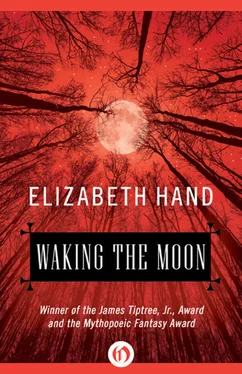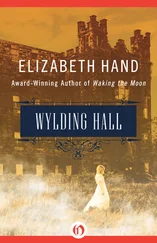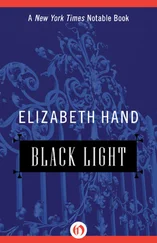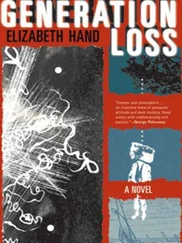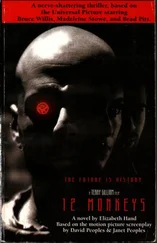“I’m sorry, ma’am?” the driver called.
Angelica started, looked at him and smiled. “Nothing, Bryant. I think if you pull up over there—”
She cocked her head to where a door stood open at the side of the Shrine.
“—right there, and if you don’t mind waiting here a few minutes.”
The driver brought the car up to where she had directed. “Man, I never knew a place for the kind of trouble we’ve had this summer. Guns and weather and everything else,” he sighed, running his hand across his forehead. “And the thing is, it just keeps getting worse and worse, and nobody ever does anything about it.”
Angelica nodded. “Quis iniquæ tam patiens urbis, ut teneat se?”
Bryant shook his head. “What’s that?”
Angelica smiled. “Just something someone said a long time ago—
“Who can have the patience, in this wicked city, to restrain his indignation?”
“You can say that again,” the driver agreed, and he reached to turn up the air-conditioning.
I thought I would go mad. Afraid to leave my office, because I might miss Dylan if he returned. Afraid to stay, because every minute that passed meant he was going farther and farther away, he was almost gone now, I was losing him, he was gone…
“Oh, god,” I cried, and laid my head on my desk. I stared at my watch, the numbers blurring: 3:45, 3:54, 3:57…
Four o’clock.
No Dylan.
Four-fourteen; four-thirty; four thirty-five. I called Annie.
“He’s not here,” she said. She sounded as though she had been crying. “Sweeney. I think you better come home.”
I have never felt anything like the air that afternoon: so moist and suffocating it was like being covered with hot wet plaster. The sky was the baleful color of lichen or tamarack. But dark as it was, the light stung my eyes, as though there was some subtle toxin in the haze, something that sapped the spirit and gave everything the livid bruised glow of a corpse. My nostrils burned; the air smelled of harsh smoke and something more organic, algae or decaying wood. I thought of the legendary swamp the city was said to have been built on—the buried River Tiber, somewhere below us the bones of people whose cemeteries had been covered over by cement and limestone and marble.
There were hardly any cars on the street. I paced nervously back and forth, looking for a cab, and had already started walking when one finally appeared.
“I’m going to Ninth Street, up by Eastern Market,” I said, and flung myself into the seat.
“You live in Northeast?” the driver asked. She was a small grey-haired woman with a ring in her nose. “You know there’s no power there, right?”
I shook my head. “No, I hadn’t heard—”
She nodded. “No power. They had to shut down the Library of Congress and the Post Office. Some people got stuck in an elevator there, a guy had a heart attack. I guess the heat. Yeah, power’s out all across Northeast. Metro’s down, everything’s off in Brookland, parts of Southeast, over in Maryland…”
The cab had no a/c, but I rolled up my window anyway. I couldn’t stand to breathe that soupy air. I couldn’t stand to think about what the driver was telling me; I couldn’t stand anything.
“Yeah,” the driver went on, wiping her face with a bandanna. “Me, I’m going home now, you’re my last fare. They’re talking about riots, you know? Power goes down, everybody takes to the street, you’re looking at some trouble, sister. This whole place up in flames before you know it. You got a boyfriend?”
I tried to say something, but all that came out was a groan.
‘“Cause you know, us ladies probably shouldn’t be out alone if something like that comes down. All this heat, makes people crazy. That’s why I’m going home now. You’re my last fare…”
There were no people on the sidewalks. No one sitting on the stoops, no one hanging out on street corners. From far away I heard a siren, but I didn’t see any police cars. I didn’t see anyone. My chest felt heavy, crushed between my fear for Dylan and this new horror: was it really as simple as this? A few weeks of terrible weather, a gathering storm; then pull the plug on the air-conditioning and subway, and the city goes up in flames?
“Yeah, I was listening to WMAL, they got an emergency generator or something I guess. They said everybody should just stay indoors. Like if you got no air-conditioning and it’s a hundred degrees out, you want to stay indoors …”
The woman gave a last harsh laugh and fell silent.
When we reached Dr. Dvorkin’s house I shoved a handful of dollar bills into the driver’s hand and stumbled from the cab. I shoved open the ramshackle door that led through the breezeway, my heart beating so hard it was as if it didn’t belong to me anymore, it was like something trying to get in. Then I was running across the patio, and then I was at the carriage house.
Annie met me at the door. Her face was beet red and wet, from crying or from the heat I couldn’t tell. “Sweeney. I tried to call but you’d already left your office…”
“Dylan?” I shouted, pushing her aside. “Dylan —”
Sitting on the couch, atop Annie’s crumpled sheets and pillows, were two men. They wore faded khakis and their shirtsleeves were rolled, their heads bowed so at first I didn’t recognize them.
Then the taller of the two looked up and saw me.
“Katherine,” he said, starting to his feet. The man beside him looked up hesitantly; then he stood as well.
“This guy said he was your landlord,” Annie said, cocking her thumb at Robert Dvorkin.
“He is,” I said numbly, but I hardly glanced at him. My eyes were fixed on Balthazar Warnick.
“Sweeney,” he said. “The time has come that we must ask for your help.”
“Help?” I shook my head, dumfounded. “You want my help? Where’s Dylan? What are you doing here?” My voice rose as my confusion boiled into anger. “What the hell is going on?”
“Please, Katherine.” Dr. Dvorkin’s tone was calm but edgy. “You must understand. We need you—”
I stared at him: so thin and worn-looking in his faded clothes, his eyes bright and desperate.
“No. Robert—you’re not…”
But of course he was. This wasn’t the Robert I had known and worked with all those years, not the neighbor and friend I had sat with in the hidden garden, drinking wine and talking of nothing at all. This was someone else entirely. This was one of the Benandanti.
“You’re—you’re one of them.”
He nodded. “Yes. But surely you knew?”
“I—I guess I did,” I said slowly. “I guess maybe I just didn’t want to.” I turned from him to Balthazar Warnick. “Why are you here? Where’s Dylan?”
My hands bunched into fists; I started to move closer to them but Annie stopped me. “If you’ve hurt him—”
“We have not hurt him,” said Balthazar Warnick quietly. “Angelica has taken her son.”
“Why?” blurted Annie.
Balthazar’s eyes remained fixed on me. “Sweeney. She will kill him—”
“No!”
“Yes. She is not the Angelica you knew, Sweeney. She hasn’t been, for—for a long time.”
For the first time since I arrived he took notice of Annie. “Tell her, Annie,” he urged. “You saw—you know what happened to the others—”
Annie stared at him in disbelief. “You knew? All along, you knew what she was doing—and you didn’t stop her? You let her kill Baby Joe, and Hasel—you almost let her kill me!” She looked as though she were about to grab Balthazar by the throat. “Why didn’t you stop her—”
Balthazar stood his ground. “We couldn’t—”
Читать дальше
